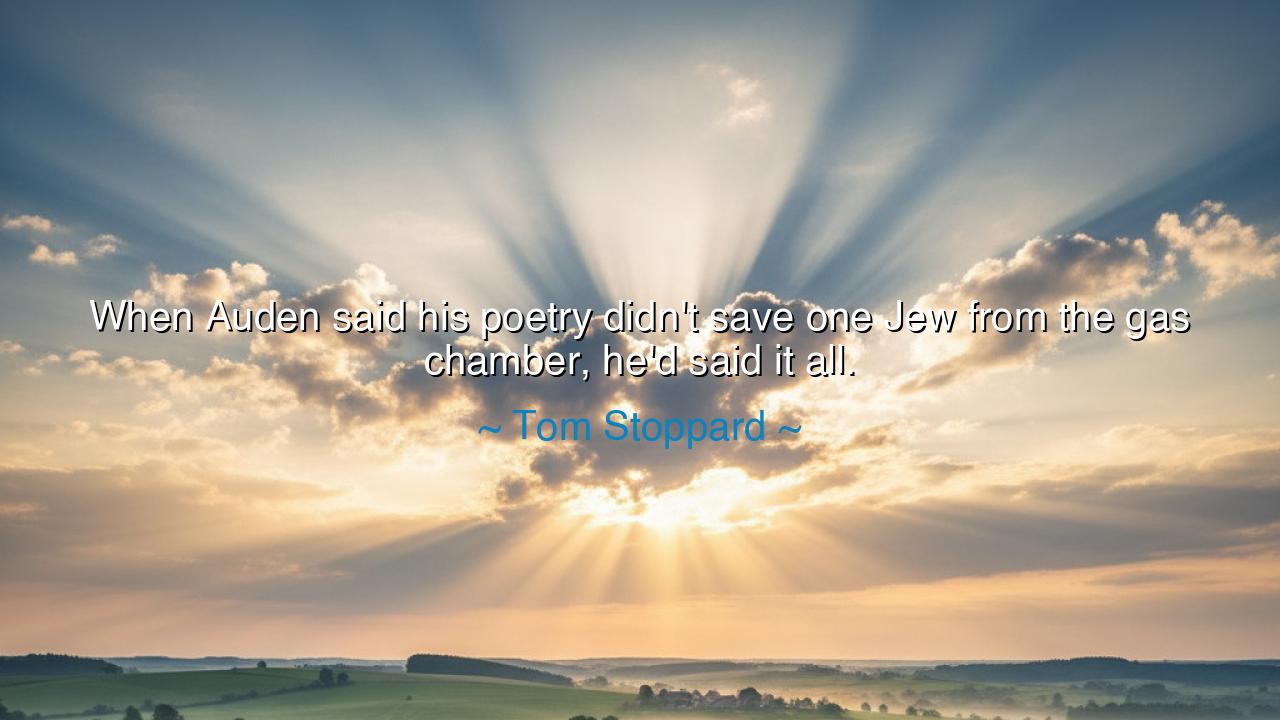
When Auden said his poetry didn't save one Jew from the gas






“When Auden said his poetry didn’t save one Jew from the gas chamber, he’d said it all.” Thus speaks Tom Stoppard, laying bare the stark truth about the limits of art in the face of history’s most monstrous horrors. His words echo like a bell of sorrow and humility, reminding us that while poetry can stir the soul and awaken conscience, it cannot always stop the hand that pulls the trigger or close the gates of the death camps.
The meaning of this saying is found in the confrontation between beauty and atrocity. Auden, a master of words, understood that his poems, however brilliant, could not halt the machinery of genocide. No stanza, however finely wrought, could wrench open the doors of Auschwitz or drag a single victim from the shadow of the gas chamber. What Stoppard acknowledges is the crushing recognition that art, for all its power, is not omnipotent. It moves hearts, but history is moved also by power, by violence, by systems that words alone cannot always shatter.
And yet, we must not mistake this recognition for despair. For though poetry could not save one Jew from the ovens, it has saved countless souls from silence and oblivion. Consider Primo Levi, survivor of Auschwitz, who bore witness not with armies but with words. His book If This Is a Man did not undo the Holocaust, but it has preserved the memory, forcing generations to look upon horror without turning away. In this way, art redeems—not by preventing death, but by honoring the dead and guarding the truth.
History is filled with such paradox. Wilfred Owen wrote his searing verses of the First World War, but his poems could not halt the guns of Flanders. He fell in battle, unprotected by his art. Yet his lines outlived the war, shaping the conscience of future generations, teaching them the futility of war more powerfully than any treaty. What Auden admitted in humility was the limit of art in the moment of atrocity; what Stoppard affirms is that this humility is itself truth—that poetry cannot save a life in the furnace, but it can save meaning in the ashes.
The lesson is twofold. First: do not deceive yourself into thinking that art alone can overturn tyranny. It must be joined with action, with courage, with sacrifice. Second: do not diminish art’s eternal role. Though it may not rescue bodies from death, it rescues memory from erasure. It gives the dead a voice that outlasts their killers. It keeps humanity awake when the temptation is to forget.
Practically, this means: let us write, paint, and speak not with the illusion that we will always halt violence by our words, but with the conviction that our words will testify, will bear witness, will keep alive what others seek to destroy. And let us also act—feed the hungry, defend the vulnerable, resist injustice—knowing that morality requires both deed and song, both resistance and remembrance.
Thus, the teaching endures: poetry did not save one Jew from the gas chamber, but it saved their humanity from being erased by those who sought to annihilate them utterly. In the face of horror, the poet’s task is not to topple empires with verse, but to ensure that truth survives when empires fall. And this is no small thing—it is the difference between silence and remembrance, between despair and the fragile hope that humanity may yet learn.






NLngoc Le
I find this reflection haunting because it forces a confrontation with the inadequacy of human expression in extreme circumstances. How do we reconcile the beauty or insight of poetry with the horrors it cannot stop? I also wonder whether Stoppard is critiquing Auden personally, or speaking more broadly about the role of all artists in historical crises. Does this acknowledgment diminish poetry’s significance, or does it intensify its poignancy as a testament to what words alone can—and cannot—achieve?
NCNhung Cao
This quote makes me think about moral responsibility and the ethics of writing. If words cannot prevent death or injustice, do they have value only in retrospect, as testimony or memory? I’m also curious about the emotional weight of this admission—does it imply resignation, guilt, or a sober realism about the limits of influence? Could it be that acknowledging these limits is, paradoxically, an essential part of what makes poetry ethically and emotionally powerful?
CTVanh Cu Te
I’m struck by the humility embedded in this statement. It seems to acknowledge the limits of language in confronting evil, while implicitly honoring the attempt to respond through poetry. Does this mean that artistic efforts are inherently inadequate in the face of systemic violence, or that their inadequacy is precisely what makes them poignant? I also wonder whether Stoppard is inviting us to question how we evaluate artistic worth when human suffering cannot be undone by creative acts alone.
TTrang
This raises a difficult question about the purpose of art. If poetry cannot stop atrocities, what is its role in society? Is it to witness, to remember, or to provoke empathy and reflection? I’m also curious about the tension between aesthetic achievement and moral responsibility—does greatness in art become hollow in the shadow of real human tragedy, or does it serve as a different kind of resistance, preserving humanity in memory and understanding?
AVTran Ai Vy
I feel a sense of discomfort reading this because it challenges the idea that art has tangible power to save lives. Does acknowledging poetry’s limitations diminish its worth, or does it elevate honesty and moral awareness? I also question whether Stoppard implies that writers carry guilt or accountability for historical events beyond their control. Can creative expression have ethical significance even if it cannot intervene directly in suffering or injustice?